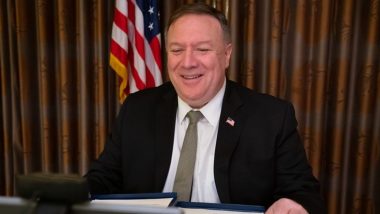US Secretary of State Mike Pompeo said that Washington would welcome an agreement based on understandings reached recently with Moscow to extend a key arms control treaty. "I am hopeful that the Russians will find a way to agree to an outcome that, frankly, I think is in their best interest and in our best interest," he added.
Pompeo's optimism came a day after confusing remarks between the US and Russian officials over the extension of the New START, the key nuclear arms control treaty between Washington and Moscow which will expire in coming months, reports Xinhua news agency. US, Russia Said Close to Deal on Nuclear Warhead Freeze.
On Tuesday, US Special Presidential Envoy for Arms Control Marshall Billingslea said the two sides have reached an agreement in principle "at the highest levels of our two governments" to extend the treaty.
"What we've indicated to the Russians is that we are in fact willing to extend the New START treaty for some period of time, provided that they, in return, agree to a limitation, a freeze, on their nuclear arsenal. We're willing to do the same," he said at an event.
Russia however, denied that such an agreement existed. According to Russian media reports, Deputy Foreign Minister Sergei Ryabkov rebuffed Washington's position on freezing nuclear arsenals."The US position in favour of freezing has long been known to us, it is unacceptable to us" said Ryabkov.
He further said that Russia would refuse any agreement on the New START that was timed to coincide with the US presidential election. Pompeo Names US Special Coordinator for Tibetan Issues.
Since June, Billingslea and Ryabkov have held three rounds of negotiations in Vienna and Helsinki on arms control issues, without making substantive progress.
In 2010, Washington and Moscow signed the New START, which stipulates the limits to the numbers of deployed nuclear warheads and strategic delivery systems by both. The New START is the last remaining nuclear arms control treaty in force between the two nuclear superpowers, will expire on February 5, 2021. The agreement can be extended for at most five years with the consent of the two countries.
(The above story first appeared on LatestLY on Oct 15, 2020 12:02 PM IST. For more news and updates on politics, world, sports, entertainment and lifestyle, log on to our website latestly.com).













 Quickly
Quickly




















